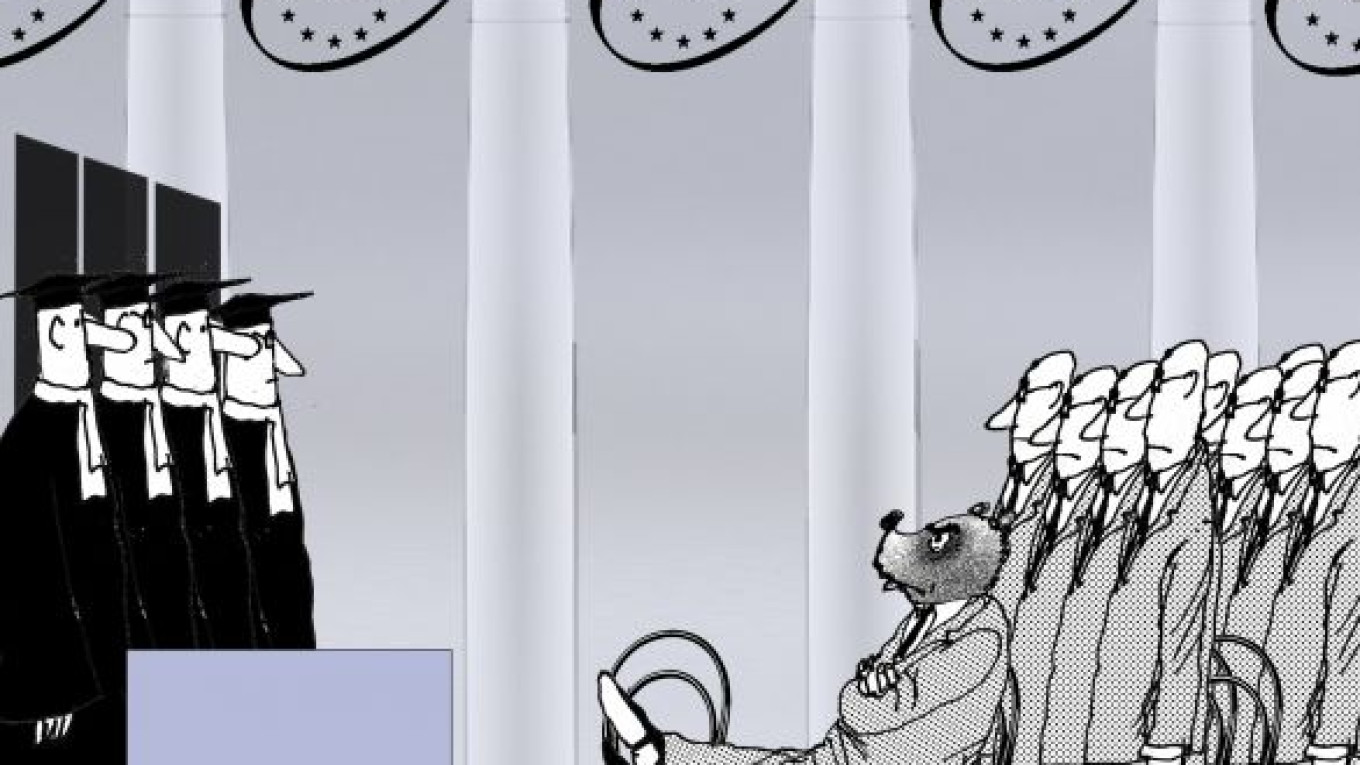Russian authorities have declared a short summer time-out in their conflict with the Council of Europe and its European Court of Human Rights in Strasbourg.
On Thursday, the State Duma decided to delay until fall a review of a bill sponsored by Federation Council Deputy Speaker Alexander Torshin that would allow the Constitutional Court to free the Kremlin in certain cases from its obligation to abide by the European court rulings against Russia. The bill would also make it more difficult for Russian citizens to sue the government in Strasbourg.
Despite the summer respite, the conflict will surely escalate once the Duma takes up the bill again in September.
But the issue is much deeper than the language in the bill. The larger question is whether Russia deserves to be a member of the Council of Europe at all.
In the early 1990s, one of President Boris Yeltsin's goals was for Russia to become a member of the Council of Europe as a key step toward becoming a full-fledged member of European society. Yeltsin very much wanted to show the outside world and Russian citizens that Russia is committed to European democratic values and, most important, human rights.
Russia first applied for membership in 1992 and became a member in February 1996. In 1998, Russia ratified the European Convention on Human Rights and agreed to subject itself to the legal jurisdiction of the European Court of Human Rights in cases when Russian plaintiffs have exhausted all legal channels within the country. The first decisions in favor of Russian citizens against the Russian government were delivered in 2002.
Over the past 15 years, the Council of Europe has closely monitored Russia to make sure that it is fulfilling its obligations as a signatory to the European Convention on Human Rights and to the European Court of Human Rights. In total, Russia has ratified more than 50 European conventions that commit the Kremlin to defend human rights in the country. But, unfortunately, these commitments remain only on paper; they have not been implemented in practice. Reports issued by the Council of Europe consistently conclude that the Russian government is not free and democratic because it does not have an independent judicial system and mass media, as well as fair elections.
Two bloody wars in Chechnya in which there were widespread violations of human rights caused deep rifts in ties in relations between Russia and the Council of Europe. In 2000, the Russian delegation's voting rights were suspended in the Parliamentary Assembly of the Council of Europe as a result of gross violations of human rights in Chechnya.
But the list of differences between the Council of Europe and Russia goes far beyond Chechnya and extends to abuses over the Yukos affair, the Russia-Georgia war in 2008 and violations of election laws aimed at opposition parties, including violating the constitutional right to participate in elections.
The Russian government loses about 90 percent of cases brought by citizens in the European court. Russia is by far the leader among the 47 members of the Council of Europe based on the number of cases filed. Since 2002, Russian citizens have flooded the council with more than 40,000 cases of human rights abuses, or 29 percent of the total. Turkey comes in a far second with just over 15,000 filed cases.
Even when Russian authorities pay compensation to victims as a result of European court decisions, this is like putting a Band-Aid over a malignant tumor. It does little to cure the underlying problem in Russia — that human rights continue to be systematically abused. The government has shown that it lacks the political will to change this.
Thus the conflict over the respect for human rights between Russia and the European court is fundamental and, most likely, will not be resolved. The Kremlin understands this better than anyone, and this is why Torshin and Constitutional Court chief justice Valery Zorkin have sent the first signal that Russia doesn't want to subject itself to the European court's jurisdiction anymore. They claim that the European court's decisions are politically motivated — read: "Russophobic." But this is only a smokescreen to hide the fact that Russia is Europe's leader in violating the human rights of its citizens.
If the Kremlin continues to violate the human rights conventions that it ratified and refuses to implement the European court's rulings, it will lead to a serious confrontation with the Council of Europe — after which Russia's total exclusion from the council will become a real possibility.
Vladimir Ryzhkov, a State Duma deputy from 1993 to 2007, hosts a political talk show on Ekho Moskvy radio and is a co-founder of the opposition Party of People's Freedom.
A Message from The Moscow Times:
Dear readers,
We are facing unprecedented challenges. Russia's Prosecutor General's Office has designated The Moscow Times as an "undesirable" organization, criminalizing our work and putting our staff at risk of prosecution. This follows our earlier unjust labeling as a "foreign agent."
These actions are direct attempts to silence independent journalism in Russia. The authorities claim our work "discredits the decisions of the Russian leadership." We see things differently: we strive to provide accurate, unbiased reporting on Russia.
We, the journalists of The Moscow Times, refuse to be silenced. But to continue our work, we need your help.
Your support, no matter how small, makes a world of difference. If you can, please support us monthly starting from just $2. It's quick to set up, and every contribution makes a significant impact.
By supporting The Moscow Times, you're defending open, independent journalism in the face of repression. Thank you for standing with us.
Remind me later.


